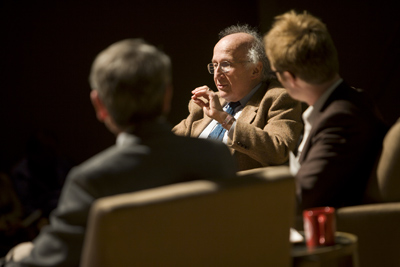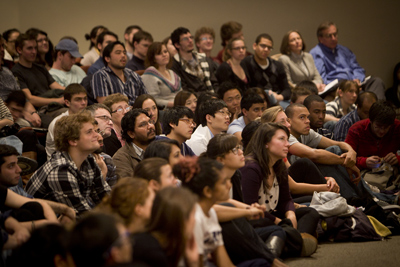Atheist Roald Hoffmann and MIT Christian agree on the sublime in science
By Michelle Spektor


In a conversation about science, God and knowledge, a nuclear scientist who is a devout Christian and a Nobel Prize-winning chemist and self-proclaimed atheist found some common ground: that not all knowing needs scientific proof.
A March 30 discussion between Roald Hoffmann, the Frank H.T. Rhodes Professor of Humane Letters Emeritus at Cornell and atheist, and Ian Hutchinson, professor of nuclear science and engineering at MIT, before an overflow audience in Statler Auditorium revealed fundamental differences in worldviews, but some surprising similarities.
Both are renowned scientists who are skeptical of scientism -- the idea that all valid, rational knowledge must necessarily be a product of science.
"I think science is one of the most powerful and successful human artifacts," Hutchinson said. "Trying to take that and inflate that into all knowledge is the error of the philosophical position I call scientism."
Hoffmann agreed, and warned against the reduction of all knowledge to science. "We all move and pleasure in nonscientific ways of knowing -- the love of our spouses, children and grandchildren, the feelings we get in listening to music or to art," he said. "If they are just taken apart into firings of neurons ... you lose all the magic of these things."
Both scholars also agreed that faith should not be held to scientific standards of proof.
"I would say it's a mistake to think religious beliefs should be tested by scientific evidence," said Hutchinson, who noted that he believes in God and follows Jesus Christ because of nonscientific, historical, personal and documentary evidence for their existence.
"Just the statement 'is there evidence for the existence of God' puts this question into a scientistic mode of expression," Hoffmann said. "I don't think that's a legitimate question."
But Hoffmann fundamentally disagreed with Hutchinson about the existence of something beyond the finite, noting that his observations of religion show that it is a "creation of human beings."
"I observe, with the help of history and books, that every culture has a need for religion of some sort," Hoffmann said. "I think it's an emergent human activity that follows from the development of consciousness."
Hoffmann noted that religion is as much present in the world as curiosity, love, humor and art. Furthermore, he argued that "the multiplicity of religions leaves me thinking that there is no one God."
Both explained how their own differing worldviews help them lead fulfilling lives. Hoffmann, a Holocaust survivor, noted that he sees more good than bad in the world and experiences spirituality through literature and the arts. "It's possible to be an ethical human being without what I would call the crutch of religion," he said.
Hutchinson said that his faith is more than a worldview or a set of ideas, but "a relationship" [with God through Jesus Christ].
However, both emphasized the importance of recognizing the sublime in the sciences.
"In small ways, we as religious believers within science can also see that nature ... is a revelation of God in a meaningful sense," Hutchinson said.
"Scientists don't want to talk about the sublime, by and large, and I think that's a mistake," said Hoffmann, who noted the powerful reactions that telescope images can elicit. "They are beautiful; why not admit that seeing that beauty brings you in communion with other people? I wouldn't want science to lose that sense of wonder."
The discussion was moderated by Andrew Chignell, associate professor of philosophy, and sponsored by the Veritas Forum, a student Christian organization on campus that seeks to foster dialogue about understandings of veritas -- the Latin word for truth.
Michelle Spektor '12 is an intern for the Cornell Chronicle.
Media Contact
Get Cornell news delivered right to your inbox.
Subscribe